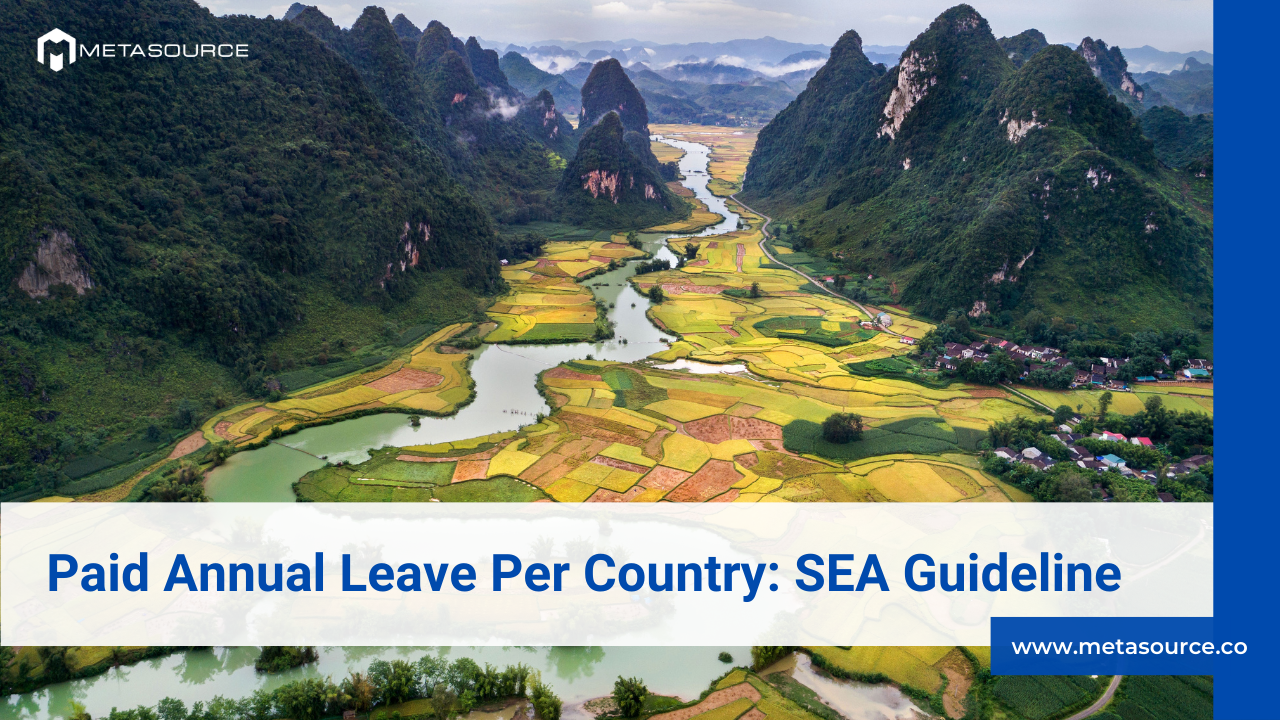Expanding a workforce across Southeast Asia requires familiarity with local labor laws, especially around paid leave, which varies by country. Employers looking to establish or grow remote teams in this region will find it essential to understand these differences to ensure compliance and appeal to potential hires. Here’s a comprehensive guide on annual leave policies across SEA countries, tailored to help senior executives and HR leaders navigate this aspect of workforce planning.
1. Why Paid Leave Policies Matter in SEA Remote Hiring
Understanding the nuances of paid leave across Southeast Asia isn’t just about meeting legal requirements—it’s a strategic move. Annual leave policies in each country reflect specific cultural values, labor laws, and workforce expectations. Companies that recognize these norms stand out in competitive hiring markets by aligning their benefits with what matters to local talent.
- Attraction and Retention: Providing competitive leave enhances job satisfaction and helps retain skilled professionals in markets with high turnover.
- Cultural Sensitivity and Engagement: Awareness of cultural norms around leave—like holidays specific to certain religions or traditions—fosters an inclusive company reputation that appeals to diverse candidates.
- Competitive Advantage: Going above the minimum leave standards can differentiate a company, making it a preferred choice for experienced professionals seeking supportive, flexible work environments.
2. Country-Specific Paid Leave Entitlements
Below is an in-depth look at the paid leave policies in six key SEA countries.
Indonesia
- Minimum Leave: 12 days per year after completing the first year of service.
- Additional Notes: Indonesia’s leave entitlement doesn’t accrue on a monthly basis but is awarded after the first year. Employees also benefit from Lebaran (Eid al-Fitr) leave, which may extend beyond standard public holidays.
- Public Holidays: Indonesia observes around 15-16 national holidays, separate from annual leave, and companies often give extended time off during major religious holidays, especially in Muslim-majority areas.
Cambodia
- Minimum Leave: 18 days annually, with an additional day added for every three years of service.
- Conditions: Leave in Cambodia is typically continuous unless there’s an agreement for split periods.
- Public Holidays: Cambodia has one of the world’s highest public holiday counts, averaging 22 days. These holidays are distinct from annual leave and must be observed by employers, especially during significant festivals like Pchum Ben and Khmer New Year.
Vietnam
- Minimum Leave: 12 days annually, increasing to 14 days for employees with five years of service, and up to 16 days for physically demanding jobs.
- Conditions: Leave may be taken all at once or divided across the year, depending on the employee’s needs and the employer’s agreement.
- Public Holidays: Vietnam has 11 national holidays, including an extended break for Tet (Lunar New Year), which often stretches over several days and is culturally significant.
Thailand
- Minimum Leave: 6 days annually after the first year of employment, though most companies provide 10 or more to remain competitive.
- Additional Leave: Many employers voluntarily offer more than the legal minimum to attract talent, especially in industries with high competition.
- Public Holidays: Thailand observes approximately 16 public holidays each year. During the Songkran Festival (Thai New Year) in April, employees often take extended leave, which is an important consideration for scheduling.
Malaysia
- Minimum Leave: Varies by service length; 8 days for 1-2 years, 12 days for 2-5 years, and 16 days for over five years.
- Industry Practice: Companies in competitive sectors tend to offer leave well above the minimum requirement.
- Public Holidays: Malaysia has 11-15 public holidays, including national and state-specific observances. Islamic holidays hold special significance, and many companies accommodate additional leave around these dates.
Philippines
- Minimum Leave: 5 days under the “Service Incentive Leave” (SIL) policy, which may be paid or unpaid, depending on company policy.
- Additional Benefits: Many employers go beyond the SIL, offering additional paid leave as part of competitive benefits packages.
- Public Holidays: With around 18 national holidays, the Philippines recognizes both regular and special holidays. Companies must provide premium pay if employees work on these dates, adding to the benefits structure.
3. Strategic Considerations for Remote Hiring Across SEA
For companies expanding remotely into Southeast Asia, understanding these leave policies provides a foundation for competitive, compliant workforce management.
- Balancing Public and Paid Leave: Each country’s specific public holiday calendar is a key consideration. For example, Cambodia’s extensive public holidays are separate from annual leave, while Thailand’s public holidays include region-specific observances.
- Cultural Awareness in Leave Management: Recognizing the significance of religious and cultural holidays—such as Ramadan in Indonesia and Malaysia or Tet in Vietnam—enhances company’s reputation and builds trust with local employees.
- Creating Competitive Leave Policies: To attract skilled candidates, companies often match or exceed minimum requirements. This is especially relevant for countries like the Philippines and Thailand, where statutory leave is relatively low, but market expectations may be higher.
Conclusion
Adapting to local leave policies in Southeast Asia is essential for compliance and for building a positive, competitive work environment. Each SEA country has unique cultural and regulatory factors shaping leave norms, from Indonesia’s Eid holidays to Cambodia’s extensive public holiday calendar. By aligning with these standards, employers can enhance job satisfaction, attract talent, and foster an inclusive workplace across the region.
Metasource: Your Trusted Partner
Metasource is your trusted partner for consulting and supporting effective staff management across global teams, especially in culturally diverse environments like Vietnam.
Read more: Navigating the Complexities of Obtaining a Working Permit in Vietnam
Read more: How To Register A Limited Liability Company In Vietnam A Quick Guide
Discover more tips to help boost your business further in Vietnam by following us on our website and Linkedln page


